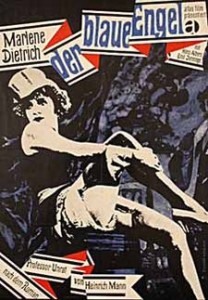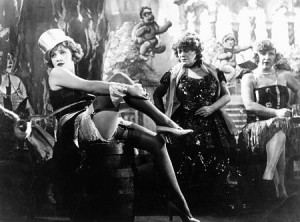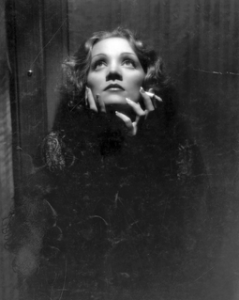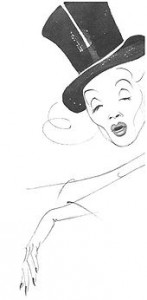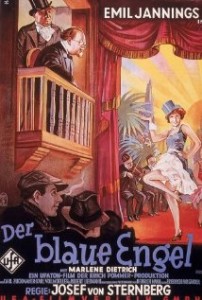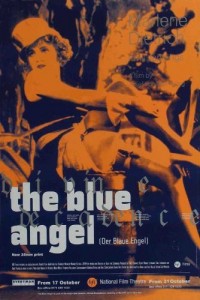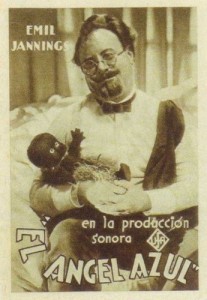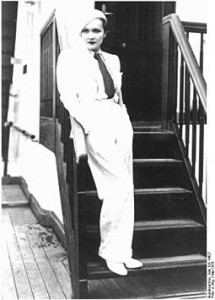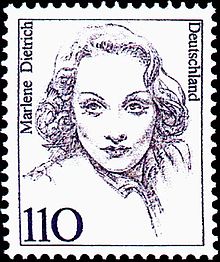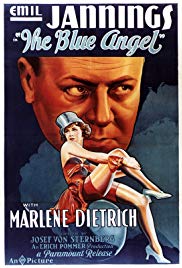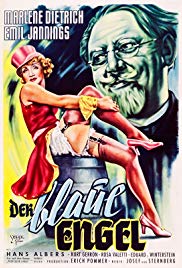The Blue Angel [Der blaue Engel] ***** (1930, Marlene Dietrich, Emil Jannings, Kurt Gerron, Rosa Valetti, Hans Albers) – Classic Movie Review 1285
Director Joseph von Sternberg’s 1930 beautifully melancholic classic The Blue Angel [Der blaue Engel] stars his protégé Marlene Dietrich as the alluring nightclub cabaret singer Lola-Lola Frohlich. She marries the fat, fussy but infatuated Professor Immanuel Rath (Emil Jannings), but soon becomes bored with him and despises him. It leads to the tragic fall of a man from a respectable professor to a cabaret clown, and his descent into rejection, humiliation, destitution and madness.
Rath starts as the esteemed teacher at a German gymnasium, the college preparatory high school. After he punishes some of his students for circulating photographs of the lovely Lola-Lola, headlining star of The Blue Angel cabaret, he goes to the club that evening hoping to catch the boys there and fatefully meets Lola.
Set in Weimar Germany, this classic of world cinema was double shot simultaneously in both German and English so the actors were required to do every scene twice. This was tricky and laborious but usual in the early sound film era, because of the technical difficulty of dubbing, and the studio’s desire to sell films in international markets. Jannings was the nominal star but on release The Blue Angel instantly turned the radiantly sensual Dietrich into a world superstar. Her mesmerising portrait of an uninhibited woman established the perennial archetype of a movie vixen.
Both performances are spot on. Jannings’s acting is pantomimic, almost silent-film performing, but it is devastatingly effective and it cuts through to the heart. The much-imitated and parodied Dietrich performance is brilliant, brittle and burning bright. She’s on fire. There’s a real vicious edge to her allure; men are attracted to the flame and burnt by its fire.
Von Sternberg films dazzlingly, encapsulating an era in the atmospheric, artificial sets of the studio. Frederick Hollander’s lusty tunes (with lyrics by Robert Liebmann) exactly capture the mood too: ‘Falling in Love Again’, ‘They Call Me Naughty Lola’, ‘Those Charming Alarming Blond Women’ and ‘A Man, Just a Regular Man’, all sung enchantingly by Dietrich. ‘Falling in Love Again’ here was the birth of what became her world-famous perennial signature song.
Based on Heinrich Mann’s 1905 novel Professor Unrat (Professor Garbage), a 1905 satire about the hypocrisy of the German middle-class, The Blue Angel is written by Carl Zuckmayer, Karl Vollmöller and Robert Liebmann, with much un-credited work by von Sternberg. He restructured the story to fit his tastes, simplifying moral themes and emphasising the anguish of the teacher, dumping the second half of the book and providing a new ending.
Von Sternberg describes the story ‘the downfall of an enamoured man’ and calls Rath ‘a figure of self-satisfied dignity brought low’. What is the film really about? Von Sternberg denies that it is an allegory for pre-war Germany and says that it is not a political statement: ‘The year was 1929, Germany was undivided, although the real Germany, its schools and other places pictured in the film were not German and reality failed to interest me’.
Also in the cast are Kurt Gerron as Zauberkünstler Kiepert / The Magician, Rosa Valetti as Guste Kiepert / The Magician’s Wife, Hans Albers as Mazeppa / The Strongman, Reinhold Bernt as Der Clown / The Clown, Eduard von Winterstein as Schuldirektor / The Director of School, Hans Roth as Hausmeister / The Caretaker of the Secondary School, Rolf Müller as Gymnasiast Angst / Pupil, Roland Varno as Gymnasiast Lohmann / Pupil, Carl Balhaus as Gymnasiast Ertzum / Pupil, Robert Klein-Lörk as Gymnasiast Goldstaub / Pupil, Károly Huszár as Wirt / Innkeeper, Wilhelm Diegelmann as Kapitän / Captain and Gerhard Bienert as Polizist / Policeman.
The Blue Angel [Der blaue Engel] is directed by Joseph Von Sternberg, runs 106 minutes, is made by UFA, released by Paramount, is written by Robert Liebmann, Karl Zuckmayer and Karl Vollmoeller, based on the novel Professor Unrat by Heinrich Mann, is shot in black and white by Günther Rittau, is produced by Erich Pommer, is scored by Frederick Hollander, and is designed by Otto Hunte.
The Blue Angel was banned in Nazi Germany in 1933, as were all the works of Heinrich Mann and Carl Zuckmayer.
The German version Der blaue Engel is much better known than the English-language version, which was believed a lost film until a print was discovered in a German film archive and restored. The restored film had its US premiere at the Castro Theatre in San Francisco on 19 January 2009 as part of the Berlin and Beyond film festival.
Lola-Lola’s nightclub act has been parodied on film by Danny Kaye in drag as Fraulein Lilli in On the Double, Madeline Kahn as Lili von Schtupp in Blazing Saddles and Helmut Berger in Luchino Visconti’s The Damned.
Jannings became jealous of the growing closeness between Von Sternberg and Dietrich, threatening to strangle her and behaving badly on set. It proved both his last great film and the UFA’s studio’s too, as many of its major talents left Germany for Hollywood, including Von Sternberg and Dietrich. They were met on the dock at New York by Von Sternberg’s wife, who served legal papers on Dietrich for ‘alienation of affection’ and divorced shortly after.
The Blue Angel earned Dietrich (who was born on 27 December 1901 and died on 6 May 1992) a contract with Paramount Pictures in the US. Dietrich’s personal life was kept out of public view. She was bisexual and enjoyed the thriving gay scene and drag balls of 1920s Berlin.
It was remade by director Edward Dmytryk in the US in 1959 with Curt Jurgens and miscast Swedish sexpot May Britt. It is a farcical folly with an absurd, obviously wrong new tacked-on ending.
Among the six Hollywood films Dietrich and Von Sternberg made together in America between 1930 and 1935 is Blonde Venus (1932), with Cary Grant. The others are Morocco, Dishonored, Shanghai Express, and The Devil Is a Woman.
Von Sternberg previously made The Last Command (1928) with Jannings, steering him to the first Best Actor Oscar.
http://derekwinnert.com/blonde-venus-1932-marlene-dietrich-cary-grant-classic-movie-review-1274/
© Derek Winnert 2014 Classic Movie Review 1285
Link to Derek Winnert’s home page for more film reviews: http://derekwinnert.com/

